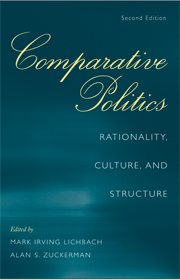Book contents
- Frontmatter
- Contents
- Contributors
- Preface and Acknowledgments
- 1 PARADIGMS AND PRAGMATISM
- 2 THINKING AND WORKING IN THE MIDST OF THINGS
- 3 ADVANCING EXPLANATION IN COMPARATIVE POLITICS
- 4 STRONG THEORY, COMPLEX HISTORY
- 5 RECONSIDERATIONS OF RATIONAL CHOICE IN COMPARATIVE AND HISTORICAL ANALYSIS
- 6 CULTURE IN COMPARATIVE POLITICAL ANALYSIS
- 7 RESEARCHING THE STATE
- 8 AN APPROACH TO COMPARATIVE ANALYSIS OR A SUBFIELD WITHIN A SUBFIELD?
- 9 THE GLOBAL CONTEXT OF COMPARATIVE POLITICS
- 10 COMPARATIVE PERSPECTIVES ON CONTENTIOUS POLITICS
- 11 CITIZENSHIP IN DEMOCRATIC POLITICS
- 12 NESTED CITIZENS
- 13 BACK TO THE FUTURE
- 14 THE COMPARATIVE POLITICAL ECONOMY OF THE WELFARE STATE
- 15 MAKING CAUSAL CLAIMS ABOUT THE EFFECT OF “ETHNICITY”
- References
- Author Index
- Subject Index
- Titles in the series
10 - COMPARATIVE PERSPECTIVES ON CONTENTIOUS POLITICS
Published online by Cambridge University Press: 05 June 2012
- Frontmatter
- Contents
- Contributors
- Preface and Acknowledgments
- 1 PARADIGMS AND PRAGMATISM
- 2 THINKING AND WORKING IN THE MIDST OF THINGS
- 3 ADVANCING EXPLANATION IN COMPARATIVE POLITICS
- 4 STRONG THEORY, COMPLEX HISTORY
- 5 RECONSIDERATIONS OF RATIONAL CHOICE IN COMPARATIVE AND HISTORICAL ANALYSIS
- 6 CULTURE IN COMPARATIVE POLITICAL ANALYSIS
- 7 RESEARCHING THE STATE
- 8 AN APPROACH TO COMPARATIVE ANALYSIS OR A SUBFIELD WITHIN A SUBFIELD?
- 9 THE GLOBAL CONTEXT OF COMPARATIVE POLITICS
- 10 COMPARATIVE PERSPECTIVES ON CONTENTIOUS POLITICS
- 11 CITIZENSHIP IN DEMOCRATIC POLITICS
- 12 NESTED CITIZENS
- 13 BACK TO THE FUTURE
- 14 THE COMPARATIVE POLITICAL ECONOMY OF THE WELFARE STATE
- 15 MAKING CAUSAL CLAIMS ABOUT THE EFFECT OF “ETHNICITY”
- References
- Author Index
- Subject Index
- Titles in the series
Summary
In the mid-1990s, the study of nonroutine, or contentious, politics had become a thriving but fragmented interdisciplinary field of study, with expertise divided across a confusing patchwork of disciplinary boundaries, geographic areas, historical eras, and nominally different types of contention (revolutions, peasant rebellions, strikes, social movements, civil wars, etc.). Most of the work in the field focused on (usually reformist) social movements in the countries of the North, with distinct bodies of research on revolutions, civil wars, and terrorism and on the contentious politics of postauthoritarian transitions. In this sense, the field of contentious politics was less a consensual than an imagined terrain of study.
The field is still fragmented, disconnected, and contentious, but we see some windows of clarity in what was an obscure wall of teaching, research, and controversy a decade ago.
First, many in the field have taken a “culturalist turn” in a deliberate departure from the dominant structuralist tradition in the social movement field, while still others have been inspired by the rational choice tradition.
Second, changes in the real world have turned many scholars' attention beyond the reformist social movements that were the stock in trade of the field to the study of terrorism, civil wars, and insurgencies.
Third, in part in response to these real-world changes and in part in reaction to the fragmentation of the field, a broad perspective focusing on contentious politics has come to occupy a distinct space in the field.
In this largely rewritten chapter, our principal goal is to encourage a crossing of the various boundaries – disciplinary, historical, geographic, and between different forms of contention – that divide the field of contentious politics.
- Type
- Chapter
- Information
- Comparative PoliticsRationality, Culture, and Structure, pp. 260 - 290Publisher: Cambridge University PressPrint publication year: 2009
- 44
- Cited by

